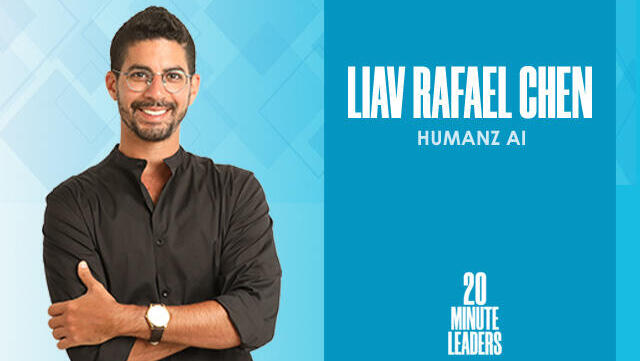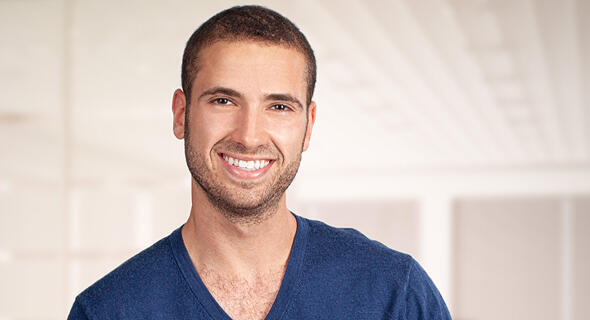
20-Minute Leaders
“The number one rule for influencer marketing is trust”
Liav Refael Chen, CEO and co-founder of Humanz AI, discusses how sharing his ideas for technology to find the target audiences for effective influencer marketing is how he got his co-founders on board and explains why trust is the most important factor in influencer marketing
Though going from the intelligence unit to developing technology for influencer marketing might seem like a big change, Liav Refael Chen says the feeling of building a great company is priceless. CEO and co-founder of Humanz AI, Chen advises others just starting their entrepreneurial journey to be willing to share their ideas with those around them. It may take some daring if you think someone might laugh at the idea or steal it, but he explains that getting feedback is the way to get signs that point you in the right direction. Sharing his ideas for technology to find the target audiences for effective influencer marketing is how he got his co-founders on board. Chen explains that trust is the most important factor in influencer marketing. Though he started out focusing on the technology side, he shares that he’s become more of a people person through leading Humanz and meeting clients.
Click Here For More 20MinuteLeaders
You were in 8200, then transitioned to building a SaaS platform to enable influencer marketing. How did you get to what you do today?
I'm originally from Eilat. I studied computers as a kid. I learned how to code and basically got my experience when I was a teenager. Then I got to unit 8200, which is the intelligence unit. I served there as a software developer, and then I went to officer's school. Then I was the commanding chief of one of the courses for the training in the Bahad. After that, I was a software team leader where I met my co-founders. We all served together.
One day, at lunchtime at Glilot base, we spoke to one of our friends who was a party organizer as a side gig. He told us that he pays a lot of money to beautiful girls on Instagram that have a lot of followers, and they bring the audiences. I asked him, "But is it working? How do you know how much to pay? How can you track that?" He was a very smart guy, but he didn't really have any answers.
So I remember that was my aha moment, and I found out there is a landscape called "influencer marketing." I found out that he has problems, but also many other brands across the world have problems. As five software developers from the army, we knew how to deal with big data. So we created algorithms for social media behavior analysis. Then we had the ability to understand users, to segment them into demographics, interests.
With that technology, we basically changed the influencer landscape. We allowed brands to find the most relevant collaborations for them. Four years later, we have more than 300 advertisers. Like Unilever, ZARA, Kimberly-Clark. There are around 65 employees in the company. We have the headquarters in Tel Aviv.
What's happening with influencer marketing? What is happening from a technological perspective that is the innovation here?
The number one rule for influencer marketing is trust. You have to trust the influencer that you're following. It's not a banner, but it's you willing to get the content because you trust the person. Now organically, the advertisement is on an Instagram page, a Twitter page, a YouTube page, a Twitch page. It's the creator’s page.
The first thing that is innovation in what we do is the measurement abilities. We can measure real exposure. We can measure real traction. We can provide you with a lot of data using our techniques. We can say, "This creator brought 100 visitors to your website that generated $50,000 in revenues." That’s something that no one else can say.
We created the ecosystem. So one way is to have the creators on board your platform, then we analyze their social behavior and social influence using a bunch of machine learning algorithms. Then we understand more information about each user. Finally, we understand if it's a real or a fake user. There are more than 20% fake users on Instagram. You can buy likes. You can buy fake followers. What we do is we basically solve this issue using measurements and analytics technology that we developed.
I think that the entire market is going for a more measurable approach. The creators now have their own brands. Humanz is right there to make sure to facilitate the entire process between the different platforms, between the different creators.
You're serving the influencers and the advertisers. Then at the end, you're also serving the people that are organically getting this exposure. What is the most challenging piece?
You're right; you have a triangle. On the one side, you have the creator; on the other, you have the brand; and on the above side, you have the consumer. From my perspective, the most important piece of that is obviously the consumer. What connects everyone together is trust.
You start the process by having a product. Then you want to find who can send the product messages out in the most performing way. So you have to find the audiences, the consumers that are interested in this product and then who can influence them. The most important part and the most challenging part is to understand the audiences online and then to find the influential, and to my recommendation, micro and nano accounts that are the best fit to influence these target audiences.
You're also doing targeted analysis: let's take this specific creator, they may have only 15,000 followers, but these are the exact followers that you as an advertiser want. Right?
Exactly. The core technology of Humanz is to identify the audiences. On top of that, we developed a SaaS platform that allows you to insert a brief and to find influencers and then approach them, manage them, and pay them. The entire workflow is on the platform. We do believe that the biggest challenge is to identify the target audience.
Paint me a picture two, three years down the line. Where are we heading with influencer marketing or the advertising space?
I see the advertising paradigm changing entirely. Meaning, you see more and more brands that rely on creators, that are more creators-oriented. You can see creators that are doing marketing strategies. I see the future goes directly to the creators when it comes to managing the entire marketing division of brands and having their own white label brands.
Based on the numbers, these are facts, the brands keep on increasing the influencer budgets. If it was 5% three years ago from your online marketing budget, you can see now that the average is around 20% from your online advertising budget. And as you have micro and nano creators that join the community and make more powerful content, you'll see more budgets.
Are you more of a marketer? Technologist? Entrepreneur? Leader?
I started as the technical guy. Together with the rest of the founders, I developed the platform. But after a year, I stopped developing. I started to do some calls. I met the clients. I understood the clients. I can say now that I'm more of a people person rather than a computers person. But somewhere in between.
You're going from something that is deep-rooted national security and then transitioning more to brand and marketing. Technologists may think that it's not the most important thing. How do you look back on this journey of yours and make sense of it?
I think it's all about satisfaction and how you feel when you get up in the morning. I’ve been smiling for almost five years when I get up in the morning. The reason is that I'm doing something that I enjoy doing, and I build something.
Together with my co-founders and the rest of the Humanz company, we're building something great. Each year, we're doing three times the revenues. You can't put a price on that feeling. That's what makes sense to me.
What can you share with young entrepreneurs who are looking for what they want to do about how to gain the confidence to pursue something that others may think is completely ridiculous?
I would say you have to focus on the signs that you get from your environment. To get signs, you have to share. You have to dare. I know a lot of entrepreneurs that say, "I have an idea, but I won't tell you because you might take it." Every aha moment that I have, I'm sharing with my friends. That's how I got my co-founders to work together with me. That's how I got the sign from the environment. Share and dare. That's the best advice I can give.
Michael Matias, Forbes 30 Under 30, is the author of Age is Only an Int: Lessons I Learned as a Young Entrepreneur. He studies Artificial Intelligence at Stanford University, is a Venture Partner at J-Ventures and was an engineer at Hippo Insurance. Matias previously served as an officer in the 8200 unit. 20MinuteLeaders is a tech entrepreneurship interview series featuring one-on-one interviews with fascinating founders, innovators and thought leaders sharing their journeys and experiences.
Contributing editors: Michael Matias, Megan Ryan
